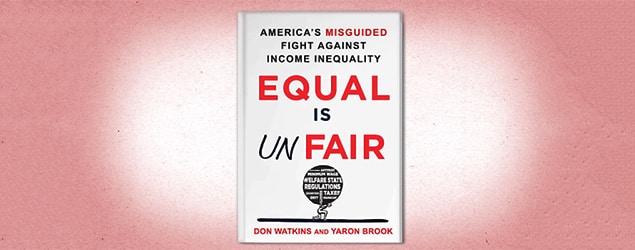Equal Is Unfair Named a Best Book of 2016

In a column for Financial Advisor, investment guru Nick Murray names Equal Is Unfair a runner-up for “best book of 2016.”
Mind and heart can readily agree on the runner-up: It’s Don Watkins’ and Yaron Brook’s Equal Is Unfair: America’s Misguided Fight Against Income Inequality. This extraordinary and indispensable book does for the “issue” of income inequality what Alex Epstein’s The Moral Case for Fossil Fuels did for climate change. It is a powerfully argued, deeply moral dismantling of the economic, social and political underpinnings of the thesis that income inequality—which must proceed, in a free society, from unequal talents, drive and discipline—is inherently inimical to the American Dream. Indeed, the authors irrefutably document that it is the American Dream: that there is and ought to be no limit to how far a person of sufficient intelligence and initiative can rise by creating value. A must read not just for advisors but for all Americans.
Earlier this year, The Federalist carried a lengthy review of the book that was similarly positive. Author John Glenn (no, not that one) writes:
Ultimately, Equal Is Unfair exposes political egalitarianism as intent on leveling all Americans downward and increasing government control. In their own right, Watkins and Brook call for the abolition of corporate welfare, an end to the government monopoly on schools, and the removal of regulatory barriers that compromise entrepreneurship.
By the end of the book, they have not only succeeded in extolling individual effort, but in freeing readers’ minds to consider the possibilities of free markets.
You can (and should!) read the whole thing here.
Meanwhile, both Yaron and I have been keeping busy with book-related media and speaking events, including a segment I did for Tomi Lahren’s popular show on The Blaze (behind a pay wall, unfortunately), and a series of debates on inequality Yaron participated in. Here’s one:
Most recently the two of us spoke to a group of 75 business leaders about the book. It was the first time we had shared a stage since FreedomFest (which one attendee called “[t]he most outstanding presentation” of the conference), and was followed by what I guess I’ll call spirited discussion, so definitely fun. On the whole, though, the audience was receptive to our message, which is important. I mean, if we can’t convince the rich not to soak the rich, we’re in trouble.
It will be interesting to see how the inequality debate unfolds over the next few years. When Equal Is Unfair was released, it looked like inequality was going to be a central issue in the presidential campaign. Bernie Sanders had made it the focus of his push for the Democratic nomination, and Hillary had echoed the theme as well. You might have noticed that things didn’t play out that way.
But the issue isn’t going away—precisely because, as we argue in the book, “inequality” does not simply name an issue: it describes the intellectual framework that shapes how most people on “the left” look at the world.
What we try to do in Equal Is Unfair is provide a rational, aspirational alternative to that framework: one that calls on Americans, not to minimize inequality, but to maximize opportunity.
For more news on ARI’s fight for a rational culture, subscribe to Impact Weekly.



